PS News presents reports on recent College activities and a selection of announcements, events and initiatives in the wider education community that will be of interest to our members. |
Standards review
The future of the profession
More than 200 Ontario educators met in Toronto, Sudbury and Ottawa during October through December 2004 to discuss the changing nature of teaching in relation to the standards of practice and the ethical standards.
Teachers, principals, parents, students and education partners took part in the consultations along with representatives of community groups and the Ministry of Education. Participants wanted to ensure that as the profession changes, the standards will continue to reflect what teachers do on a day-to-day basis.
"By discussing our teaching practices and experiences in the classroom, we further our understanding of the standards," said Dominique Echeverri, a computer science teacher at École secondaire Gisèle Lalonde. "Through this dialogue we can adapt strategies to suit today's realities."
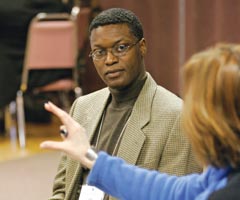 |
Participants discuss ethical standards of practice for the teaching profession during bilingual Open Space consultations in Ottawa. |
During the Open Space meetings, participants selected topics they considered important, set up a schedule and made notes on their discussions. Topics included learning styles, leadership, the dignity and ethical dimensions of the teaching profession, professional learning and respect between teachers and students.
"These consultations give members an opportunity to reflect on the standards," said College Council Chair Marilyn Laframboise. "And the participation of francophone members helps to ensure that the standards also reflect teaching and learning in a minority setting."
Participants reported an appreciation for the professional atmosphere of the meetings. Some felt that by emphasizing values, the standards give the profession dignity; others hoped professional standards help garner respect for the profession among the public.
Many members said that the consultations gave them a better understanding of the College's role.
"Many teachers see the College as an ivory tower in Toronto," says Lise St-Éloi, supervisory officer for the Conseil catholique Centre-Est. But with the consultations, she witnessed a change. "Now they see the College is actually us, as professionals."
Marie-Pier Demers, a Grade 12 student at Collège catholique Franco-Ouest - a student who participated - was very enthusiastic: "I'm really impressed with the extent to which teachers value their role."
Participants identified a need for integration of current social and educational issues - sexuality, diversity, special education - in teachers' practice.
| "The College is actually us, as professionals." |
"In Canada, 10 per cent of people have a learning disability," noted Ron Lessard, executive director for the Learning Disability Association. "So it's important to enhance and strengthen the role of teachers in helping them reach their potential."
Open Space participants have contributed 80 reports to a review by the Standards of Practice and Education Committee. The review is multi-faceted, consisting of research, analysis, consultations, surveys, focus groups and case discussions.
"Teachers' personal stories help shape the standards and keep them alive," says Jennifer Pitt, committee chair.
The committee will present a proposal for revised standards to College Council for approval at the end of the consultation process.
Linguistic Minority
Countering assimilation
The Ontario Ministry of Education has launched a new plan for the promotion of Franco-Ontarian language and culture. Key objectives include strengthening French-language education, encouraging students to develop a stronger identity as francophones and countering assimilation. The 2004 plan replaces a 1994 working document and is intended to improve the achievement of francophone students and keep them in French-language schools.
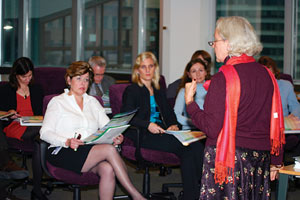 |
Michelle Boucher and colleagues from the Ministry of Education visit the College in November to inform staff about the ministry's new linguistic policy for French-language schools. |
The ministry's plan is designed as a guide for students, teachers, parents and the community as a whole. It is intended to help French-language school boards develop local activities and programs in areas such as oral and written communication and Franco-Ontarian identity.
Franco forum
More than 245 Franco-Ontarian educators gathered in Toronto in November 2004 to discuss the academic success of Ontario's francophone students.
"A successful school is one where all students are able to learn," says Robert Arseneault, secretary of the Conseil ontarien des directrices et des directeurs de l'éducation de langue française (CODELF).
CODELF forum participants choose from more than 20 workshops on contemporary issues in education. |
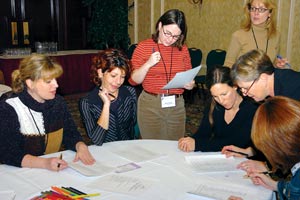 |
Participants looked at ways of motivating students, shaping their Franco-Ontarian identity, adopting effective teaching techniques and integrating technology into the classroom.
A product of months of research and development, the model presented at this forum will act as a framework for French-language boards that are harmonizing teaching practices and creating learning communities.
Teach in Ontario
Ontario College of Teachers' Registrar Doug Wilson speaks to internationally trained teachers at the official opening of Teach in Ontario at Skills for Change in Toronto |
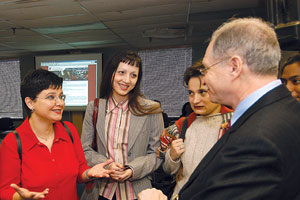 |
Apologies
The Ontario College of Teachers apologizes to members who received multiple copies of the December issue of Professionally Speaking.
The company that printed and mailed the December issue made an error that caused some members to receive two copies of the magazine while others received none. When the error was discovered, our supplier agreed to print and mail additional copies to those members who hadn't received theirs. Unfortunately, they again mailed to some members who had already received two copies.
We regret the inconvenience and waste caused to members by these mistakes. We have ensured that neither the College nor its members will incur any costs for this unacceptable series of errors by our former printer.
Members who received duplicate copies are requested to share them with a friend or to recycle them. Professionally Speaking is printed on recycled stock and is completely recyclable through the Blue Box program, which the magazine supports through an annual contribution.
RESOURCEs
Youth smoking
The good news is that the number of teenage smokers in Canada has declined since 2002. The bad news is that smoking today is more common among teens than adults, and teens are less likely to succeed at quitting - all reasons why educators need to find effective ways to help.
To this end, the Canadian Tobacco Control Research Initiative (CTCRI) has created guidelines drawn from scientific research and experience. You can find these guidelines at www.ptcc-cfc.on.ca.
Other resources
- Quit 4 Life is a bilingual smoking-cessation program aimed at teens, courtesy of Health Canada. It is also available in handbook format with an accompanying Facilitator's Guide and promotional material - all free of charge.
- Leave the Pack Behind focuses on postsecondary students.
Additional information
- Health Canada
- Program Training and Consultation Centre
- Canadian Cancer Society
- The Lung Association
- TeenNet
- US Centres for Disease Control and Prevention.
Men in Teaching
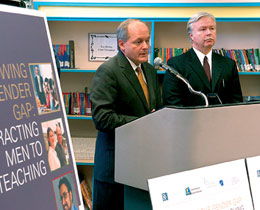 |
Education directors Jean-Luc Bernard and David Hill make a strong pitch at a November for more men in the teaching profession. Click here for the Narrowing the Gender Gap report. |
visitors
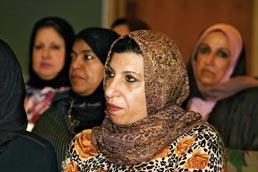 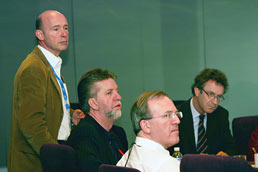 |
(LEFT): Principals from Kuwait are informed of the registration process for foreign-trained teachers and learn about the Dispute Resolution protocol.
(RIGHT): A delegation of principals from Holland learn about the accreditation of teacher education programs and receive overviews of College history, legislative mandate and standards.
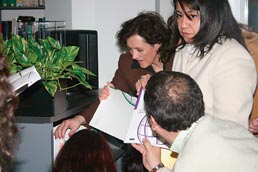 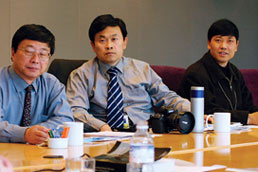 |
(LEFT): Visiting Chilean EFL teachers look at ways of making research material accessible across wide geographic regions during their visit to the College.
(RIGHT): Ministry representatives from the People's Republic of China are briefed by College staff on topics including ethical standards, standards of practice, the professional learning framework and licensing requirements.
National study
Francophone workload
The workload of Canada's francophone teachers is too heavy and too diversified. This is the main finding of a national study on the challenges of teaching in minority francophone settings outside Quebec carried out by the Canadian Teachers' Federation (CTF) and released in the fall of 2004.
According to the report, parents and the community expect teachers to demonstrate a commitment to and pride in their language and culture.
The CTF proposes compulsory courses on "pedagogy for the minority" in all teacher-training programs, increased professional development opportunities adapted to minority realities and funding formulas that take into account the unique needs of the French-language schools.
For more info, visit www.ctf-fce.ca.
Outreach
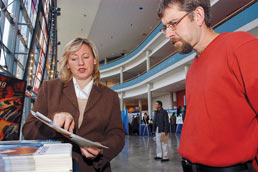 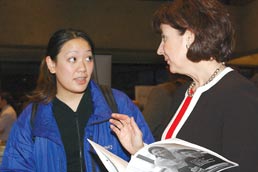 |
(LEFT): Accreditation Program Officer Kerry-Lee Finkle speaks about the teaching profession at the Mississauga Career Fair.
(RIGHT): External Relations Officer Cathy Lofgreen answered questions about the College and licensing requirements at the York University Boards' Information Fair.
Atkinson Scholar
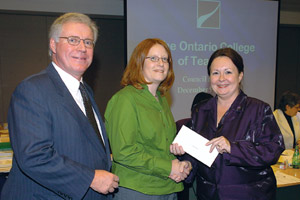 |
Former Registrar Joe Atkinson and College Chair Marilyn Laframboise present the second annual Joseph W. Atkinson Scholarship for Excellence in Teacher Education to Tracy Beck at the College in December. |
employers conference
Participants at the Northern Employer Conference in Thunder Bay discuss issues and learn about recent initiatives, including the launch of a new employer portal on the College web site. |
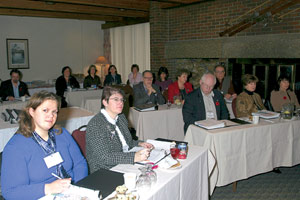 |
Your input on AQsYou are invited to participate in the review of various Additional Qualification course guidelines. Please refer to the draft guidelines and feedback forms. Click on the appropriate course - the form is at the end of the document. Complete the feedback form and forward it by e-mail to Déirdre Smith, Manager, Standards of Practice and Education Unit at pad@oct.ca. |









